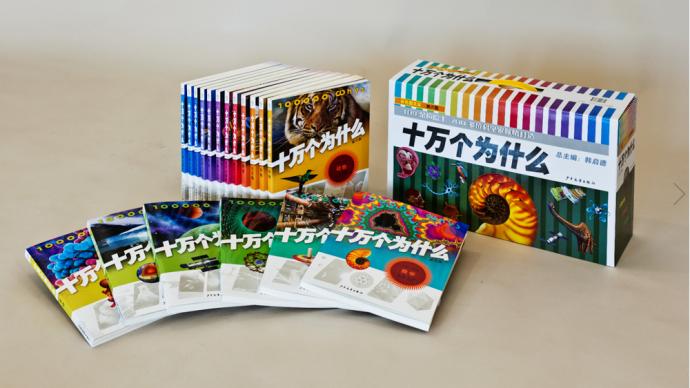
On July 28, the Shanghai Intellectual Property Court made a final judgment on the case of trademark infringement and unfair competition between the appellant Sichuan Tiandi Publishing House Co., Ltd. and the appellee Shanghai Children's Publishing House Co., Ltd.: the appeal was rejected and the original judgment was upheld.
The court found that Tiandi Publishing House's use of "100,000 Whys" in 14 book titles, book covers, sales pictures and descriptions constituted trademark infringement and unfair competition of unauthorized use of the unique names of well-known products. Ten thousand whys is a classic reading that has influenced generations... This book is an upgraded version of 100,000 whys" and other expressions constitute unfair competition of false propaganda, and should bear civil responsibilities such as stopping infringement, publishing a statement to eliminate the impact, and compensating for losses. .
Feng Jie, president of the Children's Publishing House, said: "The first case of '100,000 Why' trademark rights protection was finally won, which is a strong declaration of our ownership of the '100,000 Why' intellectual property, as a brand of '100,000 Why' A major event in the history of development, it will have a significant positive impact."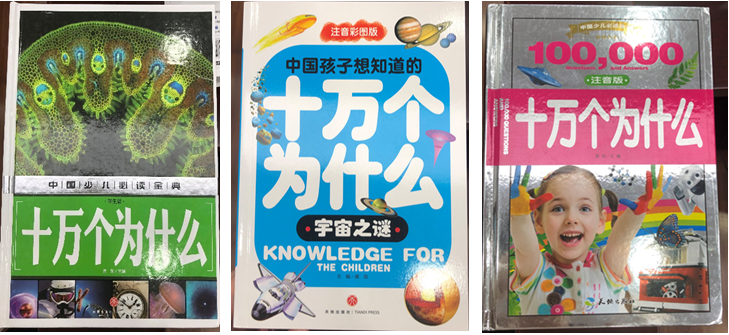
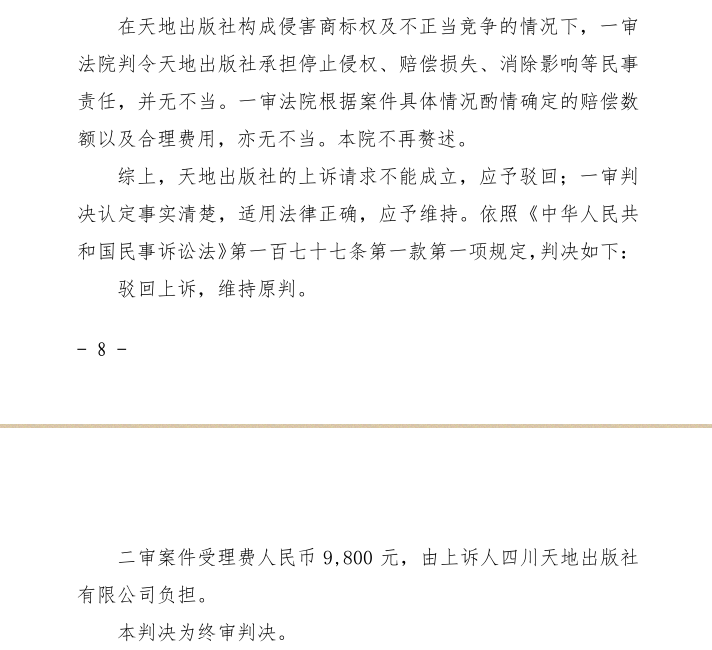
During the trial of this case, there were several major points of contention. First, whether the behavior of Sichuan Tiandi Publishing House Co., Ltd. constitutes trademark infringement. In this regard, the Shanghai Intellectual Property Court held that "One Hundred Thousand Whys" itself has an inherent meaning, but its inherent meaning is not equivalent to the generic name of the relevant commodity. Question-and-answer popular science books include the "100,000 Whys" series of books involved in the case, but "100,000 Whys" are not yet the same as question-and-answer books. The prominent use of "100,000 Whys" on the cover of relevant books by Tiandi Publishing House is not a legitimate use to explain the content of the book, but constitutes the use of a trademark to identify the source of the book, and objectively plays the function and role of identifying the source of the book , it is easy to cause confusion and misunderstanding of book buyers about the source of books or the relationship between Tiandi Publishing House and Children's Publishing House.
Secondly, whether the behavior of Sichuan Tiandi Publishing House Co., Ltd. constitutes unfair competition of unauthorized use of the unique names of other people's well-known products. In this regard, the Shanghai Intellectual Property Court held that 9 of the 14 books involved in Tiandi Publishing House were first published before June 2017 (Note: the time when the Children's Publishing House obtained the rights and trademark registration), but at this time, the Children's Publishing House was published for the first time. The "One Hundred Thousand Whys" series of books have been used and promoted for a long time, and have enjoyed high popularity and reputation in the field of children's popular science books. Therefore, it is not inappropriate for the court of first instance to determine that it should be protected as the unique name of a well-known commodity.
Third, whether the behavior of Sichuan Tiandi Publishing House Co., Ltd. constitutes unfair competition of false propaganda. In this regard, the Shanghai Intellectual Property Court held that Tiandi Publishing House used the expression "100,000 Whys are a classic reading that has influenced generations... This book is an upgraded version of 100,000 Whys" without justifiable reasons, which is easy to make readers feel The misunderstanding of the upgraded version of the "One Hundred Thousand Whys" series of books by Tiandi Publishing House Book Department of Children's Publishing House constitutes misleading false propaganda.
Attorney Dong Wentao, attorney ad litem of the Children's Publishing House, believes that the significance of this case is not only to confirm the indisputable fact that "'100,000 Why' is not a common name for popular science books" through judicial judgment, but also to protect this 60-year history in accordance with the law. The golden brand of national popular science that has accumulated over the years, and more importantly, "a case is worth a dozen documents", this case will play the function and role of the normative guidance and evaluation guidance of judicial adjudication.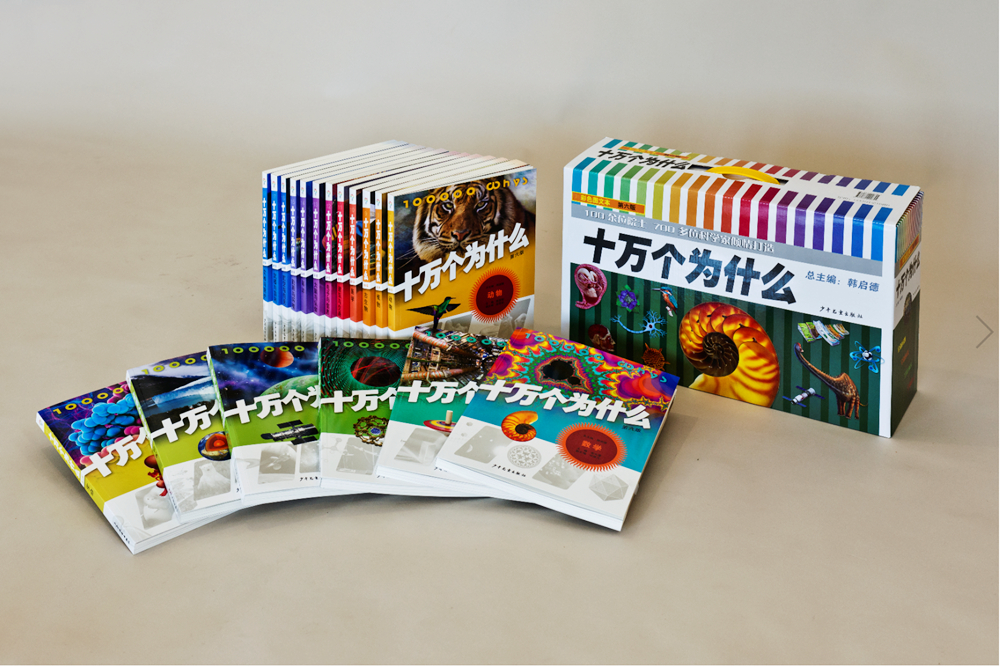 The rights protection work of the "100,000 Why" brand is still in progress
The rights protection work of the "100,000 Why" brand is still in progress
In view of the influence of the "100,000 Why" brand in the field of children's popular science publishing, a large number of counterfeit books with the words "100,000 Why" appear in the market. Based on the recognition and trust of the "100,000 Why" brand, parents of children are very easy to "get caught" when purchasing "100,000 Why", mistakenly thinking that counterfeit books are the classic popular science books they want. Most of these counterfeit books come from book companies (commonly known as "booksellers" in the industry) for the purpose of making profits. A book covering more than ten fields and hundreds of popular science issues has neither an editorial board nor a writer. There are not only many typographical errors in the content, but also full of loopholes in knowledge.
These counterfeit books are dumped at low prices in the market, which has seriously damaged the brand reputation and legitimate rights and interests of "One Hundred Thousand Whys", resulting in the proliferation of various pseudoscience and pseudoknowledge. If it is not protected, the classic brand "One Hundred Thousand Whys", which is hailed by People's Daily as "a scientific cornerstone of tomorrow's republic", may be overwhelmed by all kinds of counterfeit books. At the beginning of 2020, the Children's Publishing House decided to take up the weapon of the law and fired the first shot of rights protection.
In addition to the first lawsuit against Tiandi Publishing House in the Shanghai court, the Children's Publishing House has also initiated several rights protection lawsuits against several publishing houses in Huai'an Intermediate People's Court and Suqian Intermediate People's Court in Jiangsu Province. These cases have one thing in common: All of the accused publishers worked with the same bookseller to publish counterfeit "100,000 Whys" books. This bookseller is "Beijing Chuangshi Excellent Books Co., Ltd.", which has cooperated with about 20 publishing houses to publish more than 100 "dazzling" counterfeit "One Hundred Thousand Whys" books. Earlier in April 2022, the Intermediate People's Court of Huai'an City, Jiangsu Province had ruled in the first instance that Huaxia Publishing House, Anhui Science and Technology Publishing House and Yunnan Education Publishing House bear the civil liability to immediately stop the infringement and compensate for losses.
In November 2021, the State Intellectual Property Office included the registered trademark of "100,000 Whys" as a classic case in the national "Guidelines for Trademark Examination and Trial", and in the "100,000 Whys" related trademark invalidation, opposition, and reexamination decisions In the ruling, the ownership of "100,000 whys" was confirmed. At the beginning of 2022, the "One Hundred Thousand Whys" trademark was selected into the Shanghai Key Trademark Protection List.
Children's Publishing House has successively issued lawyer letters to dozens of publishing houses, requesting them to immediately remove counterfeit books. After receiving the lawyer's letter, many publishing houses expressed their respect for well-known book brands and their willingness to actively cooperate with the children's publishing house to remove counterfeit books through written replies, telephone calls, text messages, WeChat and other methods to the lawyers of the Children's Publishing House. Signed the "One Hundred Thousand Whys" Brand Intellectual Property Reconciliation Agreement.
Feng Jie said: "In the specific work of rights protection, we have the principle of differentiated treatment. We welcome publishers that respect intellectual property rights, admit the fact of infringement and are willing to remove infringing books, and are willing to respect intellectual property rights under the premise of Discuss each other’s interests and concerns; only for those publishers that do not respect intellectual property rights, admit the fact of infringement, and refuse to remove infringing books, will we use the law as a weapon to resolutely defend our legitimate rights and interests.”
Attorney Dong Wentao said: "Many publishing houses have a positive and sincere attitude after receiving the lawyer's letter from us, expressing their willingness to take down and reconcile, and even raised similar confusions to me: the well-known books they carefully crafted and focused on publicity are often sold by the company. 'Traffic', 'Hitchhiker', 'Near famous brand'! Some booksellers are skilled in 'scissors and paste', 'copy and paste', and can produce a large number of books with the same or similar names in a short period of time, thereby seizing the well-known high-quality books The book market causes bad money to drive out good money, and it also dazzles readers, and they are repeatedly attacked.”
It is not difficult to see from the above confusion of publishing houses that the profit-making speculation of unscrupulous booksellers is hated and despised by all publishing houses and publishing people who are committed to creating high-quality books. In this regard, lawyer Dong Wentao further believes that books are also commodities at the legal level. The name of a book is a "keyword" for consumers to find a book, and it has the attribute characteristics of identifying the source of the book. If a book has a high social reputation, then, The title of the book can be protected by the Anti-Unfair Competition Law as a "commodity name with certain influence".
Although the "100,000 Why" brand has achieved fruitful rights protection in the past two or three years, based on luck and the temptation of interests, there are still some publishers, booksellers, offline bookstores and online sales channels engaged in counterfeiting "100,000 Why" Publishing, reprinting, distribution and sale of books.
In this regard, Feng Jie emphasized that since the publication of "One Hundred Thousand Whys" (first edition) in 1961, it is precisely because of the painstaking cultivation and care of several generations of Children's Publishing House for more than 60 years, adhering to the popularization of scientific knowledge, cultivation of Scientific interest and the original intention of conveying the scientific spirit have created the golden signboard of "100,000 Whys". He said: "We should do everything we can to clear the source, any attempt to cut the blood connection between the children's publishing house and the '100,000 Why' brand, any damage to the '100,000 Why' brand reputation, and any counterfeit publishing of the '100,000 Why' brand. ' behavior and must be corrected."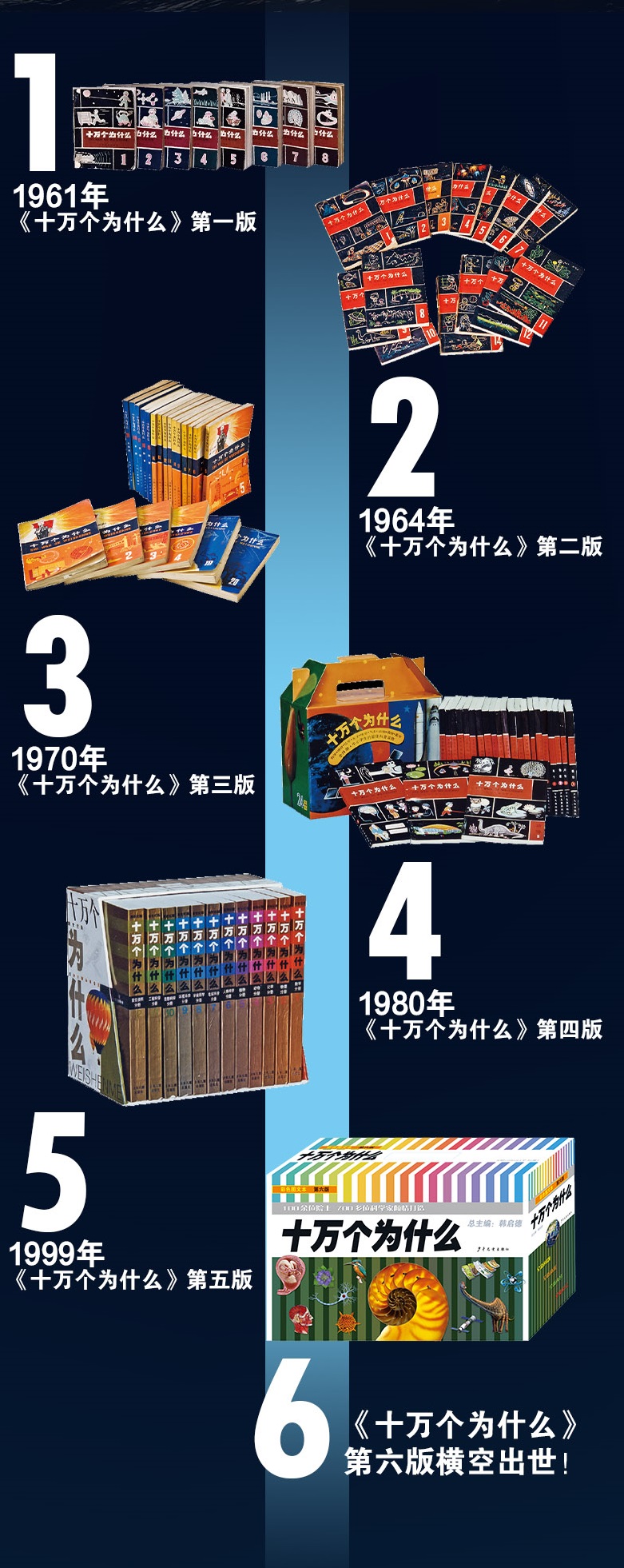
The court found that Tiandi Publishing House's use of "100,000 Whys" in 14 book titles, book covers, sales pictures and descriptions constituted trademark infringement and unfair competition of unauthorized use of the unique names of well-known products. Ten thousand whys is a classic reading that has influenced generations... This book is an upgraded version of 100,000 whys" and other expressions constitute unfair competition of false propaganda, and should bear civil responsibilities such as stopping infringement, publishing a statement to eliminate the impact, and compensating for losses. .
Feng Jie, president of the Children's Publishing House, said: "The first case of '100,000 Why' trademark rights protection was finally won, which is a strong declaration of our ownership of the '100,000 Why' intellectual property, as a brand of '100,000 Why' A major event in the history of development, it will have a significant positive impact."

Tiandi Publishing House infringing books

The picture is taken from the civil judgment of the second instance of the Shanghai Intellectual Property Court
Three major points of contention during the trial of the caseDuring the trial of this case, there were several major points of contention. First, whether the behavior of Sichuan Tiandi Publishing House Co., Ltd. constitutes trademark infringement. In this regard, the Shanghai Intellectual Property Court held that "One Hundred Thousand Whys" itself has an inherent meaning, but its inherent meaning is not equivalent to the generic name of the relevant commodity. Question-and-answer popular science books include the "100,000 Whys" series of books involved in the case, but "100,000 Whys" are not yet the same as question-and-answer books. The prominent use of "100,000 Whys" on the cover of relevant books by Tiandi Publishing House is not a legitimate use to explain the content of the book, but constitutes the use of a trademark to identify the source of the book, and objectively plays the function and role of identifying the source of the book , it is easy to cause confusion and misunderstanding of book buyers about the source of books or the relationship between Tiandi Publishing House and Children's Publishing House.
Secondly, whether the behavior of Sichuan Tiandi Publishing House Co., Ltd. constitutes unfair competition of unauthorized use of the unique names of other people's well-known products. In this regard, the Shanghai Intellectual Property Court held that 9 of the 14 books involved in Tiandi Publishing House were first published before June 2017 (Note: the time when the Children's Publishing House obtained the rights and trademark registration), but at this time, the Children's Publishing House was published for the first time. The "One Hundred Thousand Whys" series of books have been used and promoted for a long time, and have enjoyed high popularity and reputation in the field of children's popular science books. Therefore, it is not inappropriate for the court of first instance to determine that it should be protected as the unique name of a well-known commodity.
Third, whether the behavior of Sichuan Tiandi Publishing House Co., Ltd. constitutes unfair competition of false propaganda. In this regard, the Shanghai Intellectual Property Court held that Tiandi Publishing House used the expression "100,000 Whys are a classic reading that has influenced generations... This book is an upgraded version of 100,000 Whys" without justifiable reasons, which is easy to make readers feel The misunderstanding of the upgraded version of the "One Hundred Thousand Whys" series of books by Tiandi Publishing House Book Department of Children's Publishing House constitutes misleading false propaganda.
Attorney Dong Wentao, attorney ad litem of the Children's Publishing House, believes that the significance of this case is not only to confirm the indisputable fact that "'100,000 Why' is not a common name for popular science books" through judicial judgment, but also to protect this 60-year history in accordance with the law. The golden brand of national popular science that has accumulated over the years, and more importantly, "a case is worth a dozen documents", this case will play the function and role of the normative guidance and evaluation guidance of judicial adjudication.
 The rights protection work of the "100,000 Why" brand is still in progress
The rights protection work of the "100,000 Why" brand is still in progressIn view of the influence of the "100,000 Why" brand in the field of children's popular science publishing, a large number of counterfeit books with the words "100,000 Why" appear in the market. Based on the recognition and trust of the "100,000 Why" brand, parents of children are very easy to "get caught" when purchasing "100,000 Why", mistakenly thinking that counterfeit books are the classic popular science books they want. Most of these counterfeit books come from book companies (commonly known as "booksellers" in the industry) for the purpose of making profits. A book covering more than ten fields and hundreds of popular science issues has neither an editorial board nor a writer. There are not only many typographical errors in the content, but also full of loopholes in knowledge.
These counterfeit books are dumped at low prices in the market, which has seriously damaged the brand reputation and legitimate rights and interests of "One Hundred Thousand Whys", resulting in the proliferation of various pseudoscience and pseudoknowledge. If it is not protected, the classic brand "One Hundred Thousand Whys", which is hailed by People's Daily as "a scientific cornerstone of tomorrow's republic", may be overwhelmed by all kinds of counterfeit books. At the beginning of 2020, the Children's Publishing House decided to take up the weapon of the law and fired the first shot of rights protection.
In addition to the first lawsuit against Tiandi Publishing House in the Shanghai court, the Children's Publishing House has also initiated several rights protection lawsuits against several publishing houses in Huai'an Intermediate People's Court and Suqian Intermediate People's Court in Jiangsu Province. These cases have one thing in common: All of the accused publishers worked with the same bookseller to publish counterfeit "100,000 Whys" books. This bookseller is "Beijing Chuangshi Excellent Books Co., Ltd.", which has cooperated with about 20 publishing houses to publish more than 100 "dazzling" counterfeit "One Hundred Thousand Whys" books. Earlier in April 2022, the Intermediate People's Court of Huai'an City, Jiangsu Province had ruled in the first instance that Huaxia Publishing House, Anhui Science and Technology Publishing House and Yunnan Education Publishing House bear the civil liability to immediately stop the infringement and compensate for losses.
In November 2021, the State Intellectual Property Office included the registered trademark of "100,000 Whys" as a classic case in the national "Guidelines for Trademark Examination and Trial", and in the "100,000 Whys" related trademark invalidation, opposition, and reexamination decisions In the ruling, the ownership of "100,000 whys" was confirmed. At the beginning of 2022, the "One Hundred Thousand Whys" trademark was selected into the Shanghai Key Trademark Protection List.
Children's Publishing House has successively issued lawyer letters to dozens of publishing houses, requesting them to immediately remove counterfeit books. After receiving the lawyer's letter, many publishing houses expressed their respect for well-known book brands and their willingness to actively cooperate with the children's publishing house to remove counterfeit books through written replies, telephone calls, text messages, WeChat and other methods to the lawyers of the Children's Publishing House. Signed the "One Hundred Thousand Whys" Brand Intellectual Property Reconciliation Agreement.
Feng Jie said: "In the specific work of rights protection, we have the principle of differentiated treatment. We welcome publishers that respect intellectual property rights, admit the fact of infringement and are willing to remove infringing books, and are willing to respect intellectual property rights under the premise of Discuss each other’s interests and concerns; only for those publishers that do not respect intellectual property rights, admit the fact of infringement, and refuse to remove infringing books, will we use the law as a weapon to resolutely defend our legitimate rights and interests.”
Attorney Dong Wentao said: "Many publishing houses have a positive and sincere attitude after receiving the lawyer's letter from us, expressing their willingness to take down and reconcile, and even raised similar confusions to me: the well-known books they carefully crafted and focused on publicity are often sold by the company. 'Traffic', 'Hitchhiker', 'Near famous brand'! Some booksellers are skilled in 'scissors and paste', 'copy and paste', and can produce a large number of books with the same or similar names in a short period of time, thereby seizing the well-known high-quality books The book market causes bad money to drive out good money, and it also dazzles readers, and they are repeatedly attacked.”
It is not difficult to see from the above confusion of publishing houses that the profit-making speculation of unscrupulous booksellers is hated and despised by all publishing houses and publishing people who are committed to creating high-quality books. In this regard, lawyer Dong Wentao further believes that books are also commodities at the legal level. The name of a book is a "keyword" for consumers to find a book, and it has the attribute characteristics of identifying the source of the book. If a book has a high social reputation, then, The title of the book can be protected by the Anti-Unfair Competition Law as a "commodity name with certain influence".
Although the "100,000 Why" brand has achieved fruitful rights protection in the past two or three years, based on luck and the temptation of interests, there are still some publishers, booksellers, offline bookstores and online sales channels engaged in counterfeiting "100,000 Why" Publishing, reprinting, distribution and sale of books.
In this regard, Feng Jie emphasized that since the publication of "One Hundred Thousand Whys" (first edition) in 1961, it is precisely because of the painstaking cultivation and care of several generations of Children's Publishing House for more than 60 years, adhering to the popularization of scientific knowledge, cultivation of Scientific interest and the original intention of conveying the scientific spirit have created the golden signboard of "100,000 Whys". He said: "We should do everything we can to clear the source, any attempt to cut the blood connection between the children's publishing house and the '100,000 Why' brand, any damage to the '100,000 Why' brand reputation, and any counterfeit publishing of the '100,000 Why' brand. ' behavior and must be corrected."

Related Posts